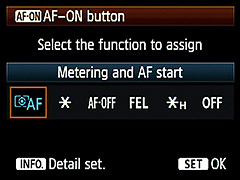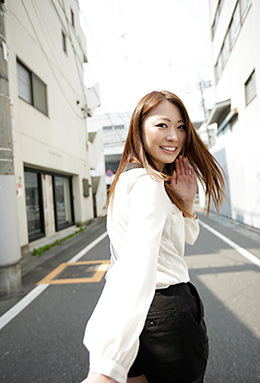Portraits – Composition and Camera Features to Capture the Best Expression
Featuring highly advanced AF functions and various shooting functions, the EOS 5D Mark III is used by a professional portrait photographer to provide an idea of how to work with your subject using this camera's amazing features. (Reported by: Hideki Takahashi)

EF85mm f/1.2L USM/ Aperture-priority AE (1/1,600 sec., f/2)/ ISO 100/ WB: Daylight
This photo was taken at noon. With light coming from a top angle, I took a shot with the model in a backlit position. In order to feature the springtime atmosphere and also to close in on the model, I used a unique technique by detaching the lens from the body to allow light to enter from the space in between.
Three Approaches to Capture the Best Expression from your Model
Composition: Position subject to the side
To me, portrait photography is very much similar to sports photography. The priorities would be reversed if we concentrate excessively on setting up a good composition, but miss out on the right moment as a result. First of all, it is important to engage wholeheartedly in capturing the expressions you like. The next step will be to find the composition you want as you release the shutter. If you are taking a close-up shot, you can create a strong impression by positioning the subject to the left or right, and cropping slightly the top part of the head.
Light: Check location in advance
I hardly use a reflector during a location shoot, because I want to capture the subject under natural light whenever possible. If I want to control the light conditions, such as adjustment of the shadows, I will need to have the subject stand beside a white wall.
Nonetheless, light control is still a difficult task when you are shooting under natural light, so it is important that you check the shooting location in advance to get an idea of the light conditions. To help you respond to the situation even better, it is good to take into account possible circumstances such as bad weather conditions.
Settings: Make use of the “Silent shooting” mode
During the course of this shoot, the feature that became my favorite is the “Silent shooting” mode. Although models generally change their pose or facial expression upon hearing the shutter sound, you can sometimes find charming expressions during this process of change. This is actually the reverse of creating a rhythm for the model using the shutter sound, and it can be employed to capture natural expressions. If you are taking continuous shots, you probably have to give up shooting in RAW and use only the JPEG format considering the writing speed. In this case, you should ensure that the white balance and exposure are properly adjusted beforehand.
 EOS 5D Mark III Recommended Feature
EOS 5D Mark III Recommended Feature

The key to portrait photography is to make sure you “do not miss out on great expressions.” Bearing this in mind, I would use the shutter button solely for the purpose of releasing the shutter. Also, to avoid not being able to locate the AE-ON button when I need to do so quickly, I have also assigned [Metering and AF start] to the AE lock button in addition to the rear AE-ON button.
Recommended Lens

I use the 50mm lens for most of my portrait shoots.With it, I can capture both close-up and distant shots. Depending on how this lens is used, you can produce images that are similar to either telephoto or wide-angle shots.

EF50mm f/1.2L USM/ Manual exposure (1/160 sec., f/2.5)/ ISO 3200/ WB: Tungsten light
The shoot took place in a room where there was almost no natural light, so I raised the ISO speed considerably to 3200. As I did not have to use a tripod, I was able to look for the right angle freely, and it took me no time to capture this shot.



EF16-35mm f/2.8L II USM/ FL: 24mm/ Manual exposure (1/1,000 sec., f/2.8)/ ISO 200/ WB: Daylight
In a dynamic situation, it is possible to capture some unexpected expressions of the model. For this scene, I set the camera to the AI Servo AF mode, and used 61-point automatic selection AF for focusing so that I can concentrate on looking for the right expression and movement.

Born in 1965. Takahashi took up photography in junior high school, and accumulated experience in different genres, ranging from railroads to landscapes and portraits, before he became a professional photographer. Currently, he is mainly involved in shooting for the beauty pages of female magazines.

































